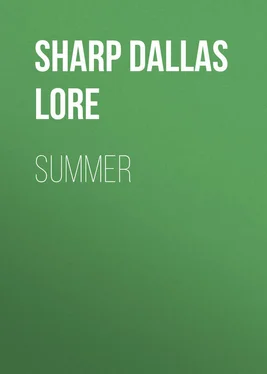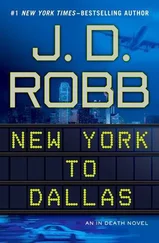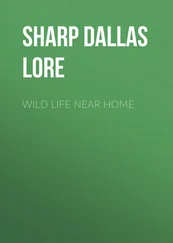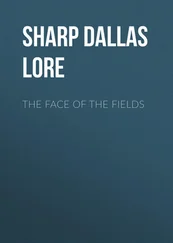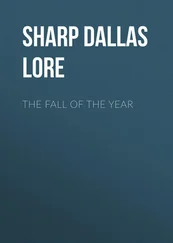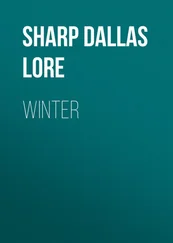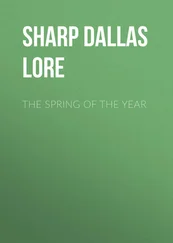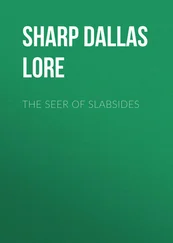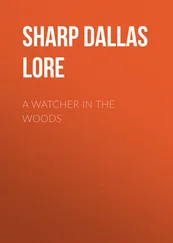Dallas Sharp - Summer
Здесь есть возможность читать онлайн «Dallas Sharp - Summer» — ознакомительный отрывок электронной книги совершенно бесплатно, а после прочтения отрывка купить полную версию. В некоторых случаях можно слушать аудио, скачать через торрент в формате fb2 и присутствует краткое содержание. Жанр: Природа и животные, foreign_antique, foreign_prose, на английском языке. Описание произведения, (предисловие) а так же отзывы посетителей доступны на портале библиотеки ЛибКат.
- Название:Summer
- Автор:
- Жанр:
- Год:неизвестен
- ISBN:нет данных
- Рейтинг книги:3 / 5. Голосов: 1
-
Избранное:Добавить в избранное
- Отзывы:
-
Ваша оценка:
- 60
- 1
- 2
- 3
- 4
- 5
Summer: краткое содержание, описание и аннотация
Предлагаем к чтению аннотацию, описание, краткое содержание или предисловие (зависит от того, что написал сам автор книги «Summer»). Если вы не нашли необходимую информацию о книге — напишите в комментариях, мы постараемся отыскать её.
Summer — читать онлайн ознакомительный отрывок
Ниже представлен текст книги, разбитый по страницам. Система сохранения места последней прочитанной страницы, позволяет с удобством читать онлайн бесплатно книгу «Summer», без необходимости каждый раз заново искать на чём Вы остановились. Поставьте закладку, и сможете в любой момент перейти на страницу, на которой закончили чтение.
Интервал:
Закладка:
Building a slide is more than we children used to do, for we had ready-made for us grandfather’s two big slanting cellar-doors, down which we slid and slid and slid till the wood was scoured white and slippery with the sliding. The otter loves to slide. Up he climbs on the bank, then down he goes – splash – into the stream. Up he climbs and down he goes – time after time, day after day. There is nothing like a slide, unless it is a cellar-door.
How much of a necessity to the otter is his play, one would like to know – what he would give up for it, and how he would do deprived of it. In the case of Pups, my neighbor’s beautiful young collie, play seems more needful than food. There are no children, no one, to play with him there, so that the sight of my small boys sets him almost frantic.
His efforts to induce a hen or a rooster to play with him are pathetic. The hen cannot understand. She hasn’t a particle of play in her anyhow, but Pups cannot get that through his head. He runs rapidly around her, drops on all fours flat, swings his tail, cocks his ears, looks appealingly and barks a few little cackle-barks, as nearly hen-like as he can bark them, then dashes off and whirls back – while the hen picks up another bug. She never sees Pups. The old white coon cat is better; but she is usually up the miff-tree. Pups steps on her, knocks her over, or otherwise offends, especially when he tags her out into the fields and spoils her hunting. The Society for the Prevention of Cruelty to Animals ought to send some child or puppy out to play with Pups of a Saturday.
I doubt if among the lower forms of animals play holds any such prominent place as with the dog and the keen-witted, intelligent otter. To catch these lower animals at play is a rare experience. One of our naturalists describes the game of “follow my leader,” as he watched it played by a school of minnows – a most unusual record, but not at all hard to believe, for I saw recently, from the bridge in the Boston Public Garden, a school of goldfish playing at something very much like it.
This naturalist was lying stretched out upon an old bridge, watching the minnows through a large crack between the planks, when he saw one leap out of the water over a small twig floating at the surface. Instantly another minnow broke the water and flipped over the twig, followed by another and another, the whole school, as so many sheep, or so many children, following the leader over the twig.
The love of play seems to be one of the elemental needs of all life above the plants, and the games of us human children seem to have been played before the dry land was, when there were only water babies in the world, for certainly the fish never learned “follow my leader” from us. Nor did my young bees learn from us their game of “prisoners’ base” which they play almost every summer noontime in front of the hives. And what is the game the flies play about the cord of the drop-light in the centre of the kitchen ceiling?
One of the most interesting animal games that I ever saw was played by a flock of butterflies on the very top of Mount Hood, whose pointed snow-piled peak looks down from the clouds over the whole vast State of Oregon.
Mount Hood is an ancient volcano, eleven thousand two hundred twenty-five feet high. Some seven thousand feet or more up, we came to “Tie-up Rock” – the place on the climb where the glacier snows lay before us and we were tied up to one another and all of us fastened by rope to the guide.
From this point to the peak, it was sheer deep snow. For the last eighteen hundred feet we clung to a rope that was anchored on the edge of the crater at the summit, and cut our steps as we climbed.
Once we had gained the peak, we lay down behind a pile of sulphurous rock, out of the way of the cutting wind, and watched the steam float up from the crater, with the widest world in view that I ever turned my eyes upon.
The draft pulled hard about the openings among the rock-piles, but hardest up a flue, or chimney, that was left in the edge of the crater-rim where parts of the rock had fallen away.
As we lay at the side of this flue, we soon discovered that butterflies were hovering about us; no, not hovering, but flying swiftly up between the rocks from somewhere down the flue. I could scarcely believe my eyes. What could any living thing be doing here? – and of all things, butterflies? This was three or four thousand feet above the last vestige of vegetation, a mere point of volcanic rock (the jagged edge-piece of an old crater) wrapped in eternal ice and snow, with sulphurous gases pouring over it, and across it blowing a wind that would freeze as soon as the sun was out of the sky.
But here were real butterflies. I caught two or three of them and found them to be vanessas ( Vanessa californica ), a close relative of our mourning-cloak butterfly. They were all of one species, apparently, but what were they doing here?
Scrambling to the top of the piece of rock behind which I had been resting, I saw that the peak was alive with butterflies, and that they were flying – over my head, out down over the crater, and out of sight behind the peak, whence they reappeared, whirling up the flue past me on the wings of the draft that pulled hard through it, to sail down over the crater again, and again to be caught by the draft and pulled up the flue, to their evident delight, up and out over the peak, where they could again take wings, as boys take their sleds, and so down again for the fierce upward draft that bore them whirling over Mount Hood’s pointed peak.
Here they were, thousands of feet above the snow-line, where there was no sign of vegetation, where the heavy vapors made the air to smell, where the very next day a wild snowstorm wrapped its frozen folds about the peak – here they were, butterflies, playing, a host of them, like so many schoolboys on the first coasting snow!
CHAPTER III
A CHAPTER OF THINGS TO SEE THIS SUMMER
Thedawn, the breaking dawn! I know nothing lovelier, nothing fresher, nothing newer, purer, sweeter than a summer dawn. I am just back from one – from the woods and cornfields wet with dew, the meadows and streams white with mist, and all the world of paths and fences running off into luring spaces of wavering, lifting, beckoning horizons where shrouded forms were moving and hidden voices calling. By noontime the buzz-saw of the cicada will be ripping the dried old stick of this August day into splinters and sawdust. No one could imagine that this midsummer noon at 90° in the shade could have had so Maylike a beginning.
I said in “The Spring of the Year” that you should see a farmer ploughing, then a few weeks later the field of sprouting corn. Now in July or August you must see that field in silk and tassel, blade and stalk standing high over your head.
You might catch the same sight of wealth in a cotton-field, if cotton is “king” in your section; or in a vast wheat-field, if wheat is your king; or in a potato-field if you live in Maine – but no, not in a potato-field. It is all underground in a potato-field. Nor can cotton in the South, or wheat in the Northwest, give you quite the depth and the ranked and ordered wealth of long, straight lines of tall corn.
Then to hear a summer rain sweep down upon it and the summer wind run swiftly through it! You must see a great field of standing corn.
Keep out from under all trees, stand away from all tall poles, but get somewhere in the open and watch a blue-black thunderstorm come up. It is one of the wonders of summer, one of the shows of the sky, a thing of terrible beauty that I must confess I cannot look at without dread and a feeling of awe that rests like a load upon me.
Читать дальшеИнтервал:
Закладка:
Похожие книги на «Summer»
Представляем Вашему вниманию похожие книги на «Summer» списком для выбора. Мы отобрали схожую по названию и смыслу литературу в надежде предоставить читателям больше вариантов отыскать новые, интересные, ещё непрочитанные произведения.
Обсуждение, отзывы о книге «Summer» и просто собственные мнения читателей. Оставьте ваши комментарии, напишите, что Вы думаете о произведении, его смысле или главных героях. Укажите что конкретно понравилось, а что нет, и почему Вы так считаете.
